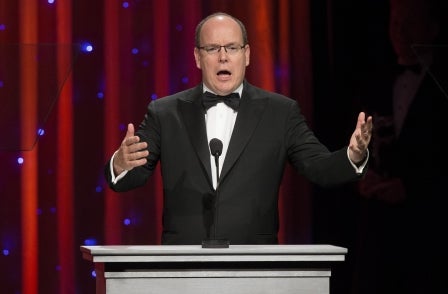
The French government is appealing a decision in which it was judged to have breached the freedom of expression of a magazine it ordered to pay damages and apologise to Prince Albert of Monaco (pictured, Reuters).
Paris Match was ordered to make the payout by the French courts after it published a story reporting a woman's claim that he was the father of her child.
The case will now go to the Grand Chamber of the European Court of Human Rights after a referral for an appeal, sought by the French government, was agreed yesterday by a panel of five judges of the Strasbourg court.
In June, the Fifth Section chamber of the Strasbourg court held by a four-three majority that the decision by the French courts failed to distinguish between information which formed part of a debate of general interest and that which merely reported details of the Prince's private life.
The court also held that the case did not simply concern a dispute between the press and a public figure – the interests of the mother, and of the child in having his identity recognised, were also at stake.
There was no reasonable relationship of proportionality between the restrictions imposed on the right to freedom of expression and the protection of the reputation and rights of others, the Fifth Section court said.
The case is the latest in a series in which members of Monaco's ruling family have sought to restrict media reporting of their activities.
It was initially taken to the Strasbourg court by Anne-Marie Couderc, publication director of Paris Match, and its publisher, Hachette Filipacchi Associes, after the French courts held that a story the magazine published in May 2005 reporting the claim by Ms C that Prince Albert was her son's father, invaded the Monegasque monarch's privacy and his right to protection of his own image.
Prince Albert issued a statement in July 2005 acknowledging that the child was his.
While he won his claim in the French courts, he failed in a simultaneous attempt to sue the magazine Bunte in Germany.
There the courts gave precedence to the public's right to be informed over the his interest in protection of his private life, saying they considered that the question of a possible male heir was of decisive importance in a hereditary monarchy and that it was for the child's mother and not for the Prince, who had not at that time acknowledged paternity, to decide whether the disclosure of the child's existence fell within the protected private sphere.
In January 2013, Prince Albert and his wife, Princess Charlene, accepted an offer of damages over a Sunday Times story suggesting she was reluctant to marry him.
The 54-year-old monarch's solicitor, Mark Thomson, said the July 2011 article – which appeared two days after the couple's wedding – accused the prince of having had the princess's passport confiscated at Nice airport to stop her from fleeing Monaco.
It suggested she was reluctant to marry because she had discovered the existence of a third love child, but agreed to the marriage for the sake of appearances in return for payment with a view to obtaining an annulment after a seemly interval.
Email pged@pressgazette.co.uk to point out mistakes, provide story tips or send in a letter for publication on our "Letters Page" blog
